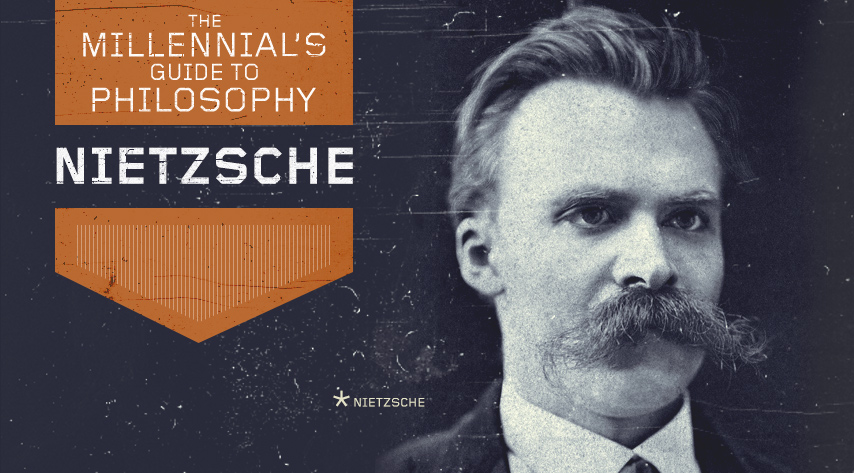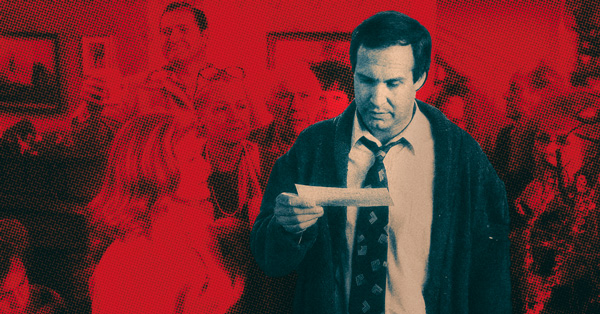What is best in life?
Since the dawn of time, philosophers and great minds have sought to find the answer to that question, hoping to discover the one true pattern or set of principles that we can all live by. But what if there is no answer?
Would that be such a terrible thing?
Friedrich Wilhelm Nietzsche didn’t think so.
Who Thought It Up:
Most of us might only remember Nietzsche as that one obscure philosopher with a mustache that’d make Tom Selleck weep with envy. Mixing metaphors and allegories with hefty doses of sarcasm and snide potshots at fellow thinkers, the man definitely isn’t an easy read.
Born in 1844 in what is today Germany, Friedrich Wilhelm Nietzsche made a name for himself as a formidable academic. Leaving his job as a professor (which he had attained at the impressive age of 24), Nietzsche spent his life devoted to the creation of a radical new worldview. Although dying before seeing his work gain popularity, Nietzsche has since become undoubtedly one of the most important philosophers in history, with his influence extending everywhere from modern psychology to noir films to (I kid you not) the lyrics of Kelly Clarkson.
What It’s All About:
The Death of God
“God is dead; but given the way of men, there may still be caves for thousands of years in which his shadow will be shown. — And we — we still have to vanquish his shadow, too.”
-Nietzsche, “The Gay Science”
Above all else, “God is dead!” stands as Nietzsche’s most famous (and infamous) declaration. It’s also his most misunderstood.
Nietzsche, in spite of his father’s job as a Lutheran minister and his own stint as a theology student, was an affirmed atheist. One can’t really declare the death of something one believes never existed to begin with. “God” in this statement wasn’t so much any deity as it was representative of the whole system of western thought. A brilliant scholar of the origins of belief systems, Nietzsche prophesied that, at long last, cracks were forming in the foundations of the rigid creeds that had dominated Western thought for centuries. There would come a day- if it had not arrived already- when the whole of it would come crashing down and leave a sudden void.
This, Nietzsche thought, was something to be welcomed.
According to Nietzsche, it was only with the absence of a universal standard of morals and values that man could be truly free to forge his own destiny. With no group to claim monopoly over truth, it would fall to every individual to decide for himself what life was all about. He called this “Perspectivism”: the hard truth that you can’t know anything with absolute certainty. Meaning isn’t something that you discover, it’s something that you make.
Beyond Good and Evil
“What is good? — All that heightens the feeling of power, the will to power, power itself in man.
What is bad? — All that proceeds from weakness.”
-Nietzsche, “The Antichrist”
At first glance that quote can seem barbaric- and you certainly wouldn’t be alone in accusing Nietzsche of idolizing jackbooted savagery. What’s important, however, is to understand the context behind it. For Nietzsche, there was no way of proving objective morality. One person might work on the assumption that violence is an acceptable way to stand up to evil. Another person might say that violence is evil, no matter the circumstances. Both are going to run head to head with each other and both are going to have to stand up for what they believe to be true.
So who is in the right?
Well according to Nietzsche it would be the person who’s more courageous, more intelligent, more inventive, and more determined. A simple case of “may the best man win.”
If you’ve ever rooted for Michael Corleone in The Godfather or Danny Ocean in Ocean’s 11, you’ve seen this yourself. Sure Michael’s a mafia don and Danny’s a conman, but damned if we don’t respect their ingenuity and determination.
Frontier justice, the law of the jungle- call it what you will.
Amor Fati
“What does not kill me makes me stronger.”
-Nietzsche “The Twilight of the Idols”
This phrase basically translates to “the love of fate.” It’s an idea with its roots in the writings of a number of Stoic authors, but while the Stoics insisted that hardship was something to be tolerated, Nietzsche argued that it was something to take joy in. Now that’s not masochism we’re talking about. Nietzsche doesn’t argue for taking pleasure in the universe kicking you while you’re down, he argues for taking satisfaction in it- in the knowledge that when it’s all over, you’ll rise up from your ashes tougher and smarter than ever.
Every struggle, every doubt, every moment of hurt is just a way of making you stronger. “Pain is weakness leaving the body,” as the marines say. While the entire concept goes deeper into Nietzsche’s concept of eternity, pain remains as the great definer. What doesn’t break you helps you grow, what does break you gives you a warrior’s death.
The Ubermensch
“Become who you are.”
-Nietzsche, “The Gay Science”
Those able to learn from their suffering, those able to evolve, those able to harness their passions and emotions and instincts with their reason and intellect- these people would rise up above their fellow man. “Ubermensch”, Nietzsche dubbed such individuals, “overmen” or “super-humans”.
As imposing as that might sound, and for all of his lofty maxims about power, ambition, and destiny, this end goal (which he thought only a handful of humans would ever truly achieve) would not take the form of a tyrant trying to conquer the world or a monk attempting to reject it.
So what would it look like?
In essence, a fully-realized human being.
The chaotic, destructive, and instinctual forces that live in us all (what Nietzsche dubbed “Dionysian”) are just as important as the orderly, creative, and rational (our “Apollonian” elements). One side isn’t meant to overcome the other, but rather the ubermensch will have a healthy balance of both. Indeed, Nietzsche asserts that having a dark side is the only way we can even begin to hope to be good. A lion without claws or teeth isn’t gentle- just mutilated. You have to choose to embrace your full potential: the good, the bad, and the ugly all rolled into one.
Of course, it’s not enough to just overcome, you need to thrive. “Without music,” Nietzsche declared, “life would be a mistake.” Life and this world are something to be enjoyed, not something to escape from. In short, Nietzsche’s “super-human” is simply the most human a human can be.
And again, very few people will ever attain this level, and it all comes down to the terrifying prospect that you and you alone are the master of your destiny. For Nietzsche, what terrifies people the most is not their failings but their potential. We’re scared of having power. We’re scared of being free. We’re petrified of being all that we know we can be.
What It Means For Us:
Life beyond college is tough for many reasons, with perhaps the greatest one being the lack of any sense of order. Let’s face it- we’re used to having limits, rules, and objectives. We studied to get good grades, we got good grades to get into a good college, we studied in college to get good jobs, and so on and so forth.
But with college rapidly disappearing in the rearview, all those rules, all those goals, they all go out the window. Sure, we’re still told what to do: “Buy a house, get married, start a family.” The problem is, that pattern doesn’t seem to make much sense these days. You can blame what you want- prolonged adolescence, the lingering effects of the economic crash, crippling student loan debt– but the fact remains that, for one reason or another, it can feel like the whole world’s been turned upside down.
While college gives us a taste of what the world is like (a strange and often chaotic place full of people with perspectives and values that often seem alien to our own), we’re not truly hit with the full weight of that until we’re out in the real world. We’re suddenly stuck with no instruction manual, and it can be terrifying.
How do we make sense of all this? How do we reconcile what we see as true with all the different things everyone else believes?
“Don’t try to.” Nietzsche would tell us.
In a world where we struggle to fit in, Nietzsche delivers a stern slap across the face and shouts that there’s nothing wrong with us. Nothing except that we aren’t as much ourselves as we could be. Live by your own rules and learn from your own mistakes. You can’t be anything other than what you are, so why not be the best you can be? Grow. Evolve. Set your own goals and make your own meaning. As Nietzsche himself put it, “No one can construct for you the bridge upon which precisely you must cross the stream of life, no one but you yourself alone.”
Take pride in that.
Required Reading:
Thus Spake Zarathustra – Nobody can say that Nietzsche is an easy read. As much as we’ve studied the man we’re still debating the meaning of certain passages and cryptic references. That being said, if there’s anywhere to start it’s Thus Spake Zarathustra, perhaps one of the best summaries of his entire philosophy. While no less complex than any of his other works, the difficulty is offset by the beauty of the text- chances are that you’ll be haunted by his parables and proverbs long after you’ve given up trying to decipher them.
“Self-Reliance” – Like the principles Nietzsche talks about but sick and tired of slogging through all the jargon and obscure references? If so, you might prefer the works of his favorite poet, Ralph Waldo Emerson. Specifically, the great poet’s most iconic essay “Self-Reliance”, a sermon on individualism, independence, and free-thought, as stirring as it is simple.
Fight Club– Chuck Palahniuk’s 1996 masterpiece reads like a crash course in Nietzschean thought. Break free from conformity to what society says you should be. Take pride in every black eye and chipped tooth. It’s only once you’ve lost everything that you can be anything. If you’re looking to get a grasp of the philosophy in the space of a couple days, you won’t find much better than this.
The Millennial’s Guide to Philosophy
- The Millennial's Guide to Philosophy: Stoicism
- The Millennial’s Guide to Philosophy: Epicureanism
- The Millennial’s Guide to Philosophy: Nietzsche
- The Millennial’s Guide to Philosophy: Postmodernism
- The Millennial’s Guide to Philosophy: Confucianism
- The Millennial’s Guide to Philosophy: Taoism
- The Millennial’s Guide to Philosophy: Sartre
- The Millennial’s Guide to Philosophy: Kierkegaard
- The Millennial’s Guide to Philosophy: Camus






![It’s Time to Begin Again: 3 Uncomfortable Frameworks That Will Make Your New Year More Meaningful [Audio Essay + Article]](https://www.primermagazine.com/wp-content/uploads/2025/01/begin_again_feature.jpg)









